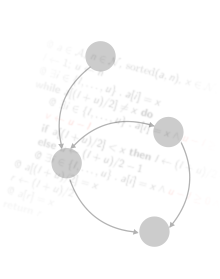The 53th meeting of the Prague computer science seminar
Tomáš Pevný
Steganography
Steganography communicates a secret message as an innocuous looking object concealing the fact that something important is being communicated.
Steganography communicates a secret message as an innocuous looking object concealing the fact that something important is being communicated.

Steganography communicates a secret message as an innocuous looking object concealing the fact that something important is being communicated. Steganography is therefore more devious than cryptography, since when someone uses the latter, everyone knows that something is being hidden. Throughout history, steganography has been used by spies, agents, dissidents, and criminals. The oldest documented uses come from the old Greece at 5 BC. With the advent of digitization, steganography has moved to the new media such as digital images, video, text, file systems, etc.
I will introduce the topic by talking about major breakthroughs in which I have participated, which have ultimately led to the most principled design of steganographic algorithms known to date, theoretically applicable to a diverse set of media such as images or sound. We will explain how error-correcting codes revolutionized the field. Since then, creating a new steganographic algorithm is equal to finding a good model of the noise. This is surprisingly difficult. Our first algorithm embracing this paradigm was broken in the first steganographic contest that we have organized. The rest of the talk would be devoted to the design of noise models by a combination of game theory and adversarial machine learning.
Tomas Pevny is an associate professor at FEE, CTU in Prague. While his main interest was machine learning, an offer to study in USA at Binghamton University introduced him to steganography, in which he pursued his PhD. After one year of post-doc in Grenoble, France, he returned in fall 2009 to CTU and remained there since then, with part-time excursions to Cognitive security, Cisco systems and Avast (now Gen digital). His current research interest is in tailoring machine learning for computer security. He has co-authored more than 50 papers and holds approximately 20 patents.
Its program consists of a one-hour lecture followed by a discussion. The lecture is based on an (internationally) exceptional or remarkable achievement of the lecturer, presented in a way which is comprehensible and interesting to a broad computer science community. The lectures are in English.
The idea to organize this seminar emerged in discussions of the representatives of several research institutes on how to avoid the undesired fragmentation of the Czech computer science community.
The seminar is organized by the organizational committee consisting of Roman Barták (Charles University, Faculty of Mathematics and Physics), Jaroslav Hlinka (Czech Academy of Sciences, Computer Science Institute), Michal Chytil, Pavel Kordík (CTU in Prague, Faculty of Information Technologies), Michal Koucký (Charles University, Faculty of Mathematics and Physics), Jan Kybic (CTU in Prague, Faculty of Electrical Engineering), Michal Pěchouček (CTU in Prague, Faculty of Electrical Engineering), Jiří Sgall (Charles University, Faculty of Mathematics and Physics), Vojtěch Svátek (Prague University of Economics and Business, Faculty of Informatics and Statistics), Michal Šorel (Czech Academy of Sciences, Institute of Information Theory and Automation), Tomáš Werner (CTU in Prague, Faculty of Electrical Engineering), and Filip Železný (CTU in Prague, Faculty of Electrical Engineering)